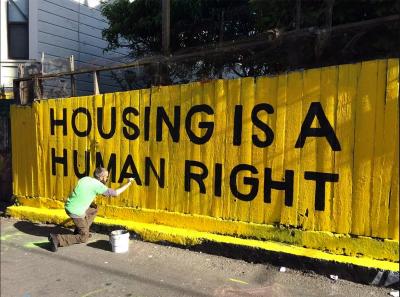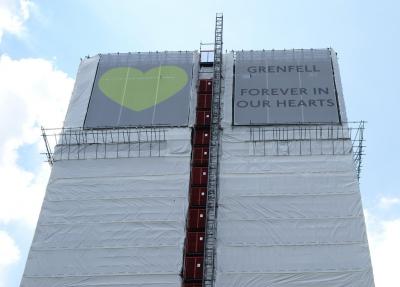A Human Right to Housing?
The unwritten Constitution of the UK does not contain a “right to housing” per se. Calls for Parliament to introduce a “right to housing” are not new, but the Grenfell Tower fire has resulted in renewed impetus and debate. It is important to discuss in more detail how a right to housing as a socio-economic right could potentially manifest itself and discuss several of the hurdles such a standard would inevitably encounter. The right to adequate housing was given legal recognition in the International Covenant on Economic, Social and Cultural Rights (“ICESCR”). Article 11(1) of the ICECSR states that:
“[…] the present Covenant recognize the right of everyone to an adequate standard of living for himself and his family, including adequate food, clothing and housing, and to the continuous improvement of living conditions”.
Posted:
Time to read:

The right to housing should not be interpreted in a narrow or restrictive sense which equates it with, for example, the shelter provided by merely having a roof over one’s head or views shelter exclusively as a commodity. Rather, as defined by General Comment No. 4 of the United Nations Committee on Economic, Social and Cultural Rights (“the Committee”) it should be seen as the right to live somewhere in security, peace, and dignity. The right traverses the relationship between housing as a physical thing and as an ideological construct (for more detail see, J. Hohmann, The Right to Housing: Laws, Concepts, Possibilities (Oxford: Hart Publishing, 2013)). The right must be interpreted in accordance with Article 2(2) of the ICESCR and therefore must not be subject to any form of discrimination. The Committee has come to consider several factors as indicative of “adequate housing” under the ICESCR. These include: legal security of tenure; availability of services; affordability; habitability; accessibility; location; and cultural adequacy. These seven factors set, and remain, the benchmark for the realisation of the right to housing.
The Limits of the Right to Housing
The incorporation of the ICESCR into the domestic law of the UK was considered after the passing of the Human Rights Act 1998. This was in part inspired by a fear that the ECHR was an “outmoded” treaty and as such protected, at best, a very basic minimum standard of living. The inclusion of socio-economic rights was, however, dismissed as it was felt that the principles were non-justiciable.
The incorporation of Article 11 of the ICESCR into the domestic law would raise several, perhaps insurmountable challenges. The first concern is what guidance would the courts have to define the right to housing and key terms such as “adequacy”. While the ICESCR and the Committee have attempted to offer some guidance, the definition remains open-textured. As Jessie Hohmann concludes:
“The failure of courts and monitoring bodies to provide a definition of the right thus impacts directly on those hoping to lay claim to the right in order to struggle against homelessness, inadequate housing, forced resettlement, or other material deprivation and marginalisation. If the right cannot be laid claim to it is a hollow promise and any attempt to invoke it as an instrument in a project of advocacy is fraught with uncertainty”.
Merely legislating in a manner that purports to embody socio-economic rights does not necessarily result in their greater realisation. Comparative perspectives offer some limited guidance. The South African Constitution is often held up as the pinnacle of modern constitutional draftmanship. Article 26 of the Constitution states that “[e]veryone has a right to have access to adequate housing”. Guidance was given by the Constitutional Court of South Africa in the famous Grootboom case:
Housing entails more than bricks and mortar. It requires available land, appropriate services such as the provision of water and the removal of sewage and the financing of all these, including the building of the house itself. For a person to have access to adequate housing all of these conditions need to be met: there must be land, there must be services, and there must be a dwelling. The right of access to adequate housing also suggests that it is not only the State that is responsible for the provision of houses, but that other agents within society, including individuals themselves, must be enabled by legislative and other measures to provide housing.

Minimum Core
The standard of progressive realisation remains weak. If the proponents of a right to housing are serious about the legal recognition of the right they cannot continue with the deferential standard of “progressive realisation” and “reasonableness” but instead must move towards a more assertive approach to socio-economic rights and rationalise a “minimum core”. Rationalising the minimum core would require the politicians and drafters to ignore their conceptions of a utopian society. Instead, they would be required to address the most basic interests as expressed through the human rights paradigm. In 1991, The Committee, in General Comment No.3 introduced the principle of the “minimum core”, to give greater weight to the ICESCR by focusing on the “minimum essential levels”.
The introduction of a minimum core would allow for socio-economic rights to be given a directional purpose, but perhaps more significantly would allow for the clear identification of laws and policies that have regressive consequences on the realisation of the right to housing. The relatively low standard set by the minimum core would prevent the courts from trespassing on the domain of democratic institutions. However, if the State did not fulfil the minimum core of the rights contained in the ICESCR, it would be required to justify this. In doing so, it would give the courts the ability to hear complaints about socio-economic rights and, where necessary, provide effective remedies.
The significance of establishing a minimum core is that once it can be established that the minimum core is not adequately protected, the burden shifts to the state rather than the individual. Once claimants are able to prove that their minimum core is not protected, it will be for the state rather than the applicant to prove that it has taken the required “reasonable legislative and other measures, within its available resources, to achieve the progressive realisation”. In reversing the onus onto the state, the minimum core can help to ensure “practical justiciability,” turning a “paper right” of access to court into a practical reality.
Caution is necessary. In South Africa, the government and judiciary have opposed the establishment of a minimum core. The Constitutional Court in particular has focused on administrative law principles of “reasonableness”, and a weak conception of state engagement. The result is that in most instances where the state is found to be violating Article 26 of the South African constitution, little, sometimes nothing, is done to remedy the breach. The problem with this standard was identified by the Committee in General Comment 3 that “[i]f the [ICESCR] were to be read in such a way as not to establish such a minimum core obligation, it would be largely deprived of its raison d’être”. However, finding the political support and financial resources for such a radical reform, as establishing a minimum core of the right to housing in the UK, is difficult to envisage in the near future.
It is important to remember that many facets of what we can rationalise as the right to housing are in theory already protected and enforceable in England and Wales. The problem is that the existing regulatory system that governs access to, and the relevant standards of, housing is malfunctioning. The scale of the problem is set out in the Government’s Housing White Paper, Fixing our Broken Housing Market (2017) and in Closing the Gaps: Health and Safety at Home.
Further, when considering human rights and the incorporation of a “right to housing” it is important to consider the potential ramifications of such a significant move. Incorporating Article 11 of the ICESCR into domestic law would be controversial. The problem is that certain corners of the media and politics are quick to seize on the enforcement of socio-economic rights or the ICESCR as allowing for a “scroungers charter”, giving individuals the right to enforce what are purported to be unearned privileges. As a result, it is important to remember that by framing this as a question of “human rights”, this area of housing law risks becomes subject to a greater level of scrutiny.

Conclusion
There is a moral rationale underpinning the right to housing in Article 11 of the ICESCR, especially in light of the Grenfell Tower Inquiry which has once again exposed UK’s poor record of providing adequate housing for the most deprived in society. However, the problems, as discussed in this blog post, are vast. As such, rationalising a minimum core, finding the vast financial resources required and then trying to traverse the complex problem of political will, means that implementation of a human right to adequate housing in the UK remains, for now, dishearteningly out of reach.
__________
How to cite this blog post (Harvard style)
Maxwell, D. (2019).A Human Right to Housing? https://www.law.ox.ac.uk/housing-after-grenfell/blog/2019/02/human-right-housing (Accessed [date]).
Keywords:
Share:
